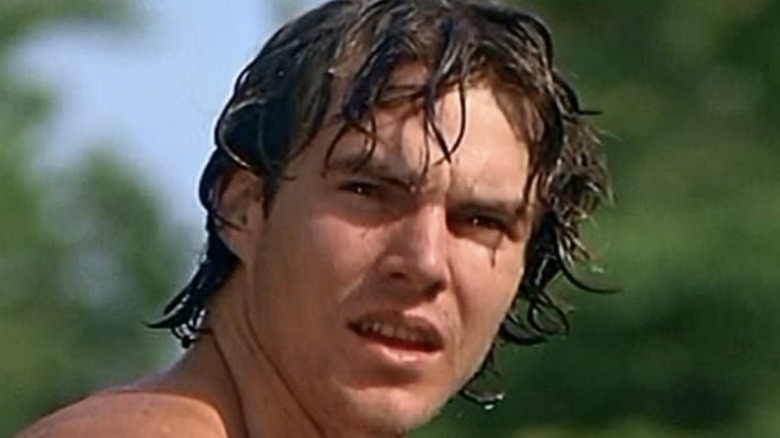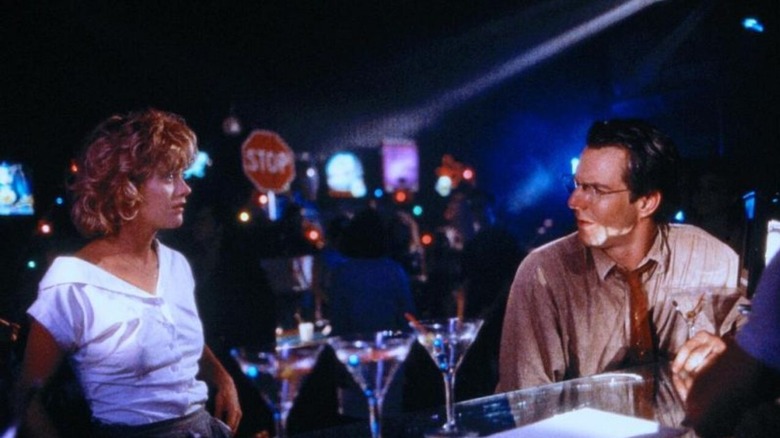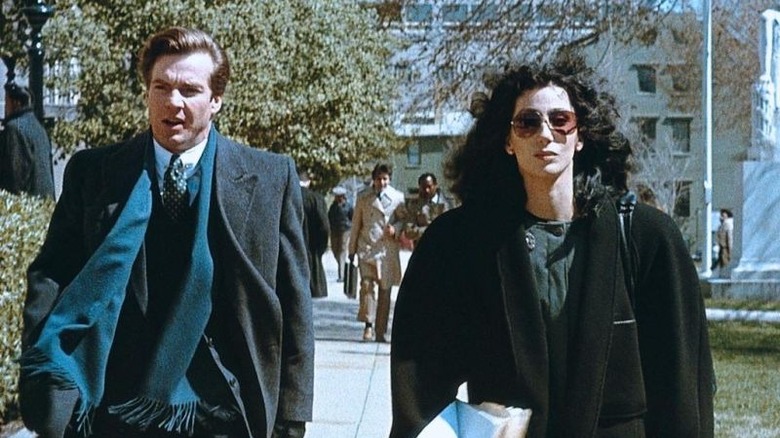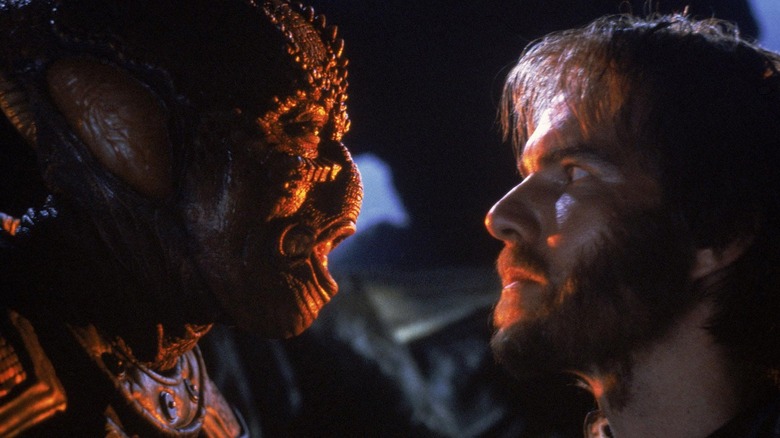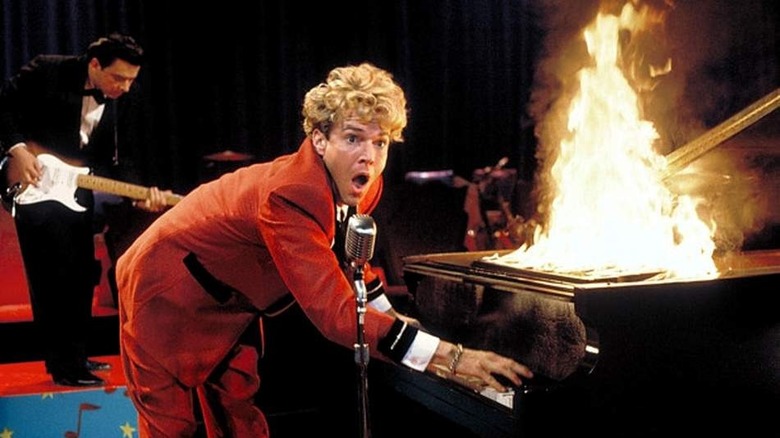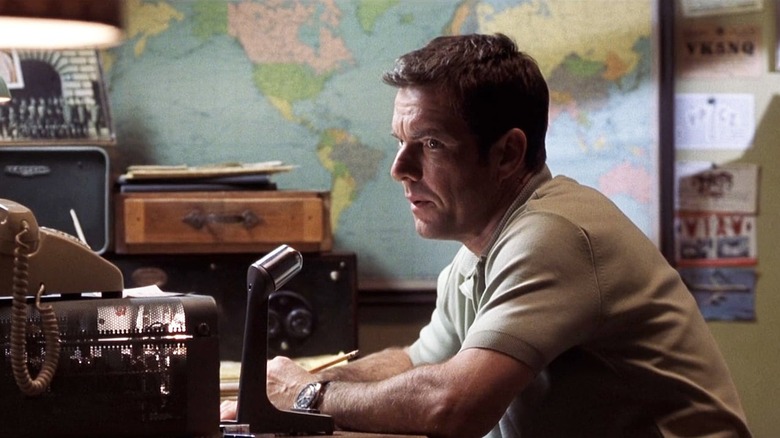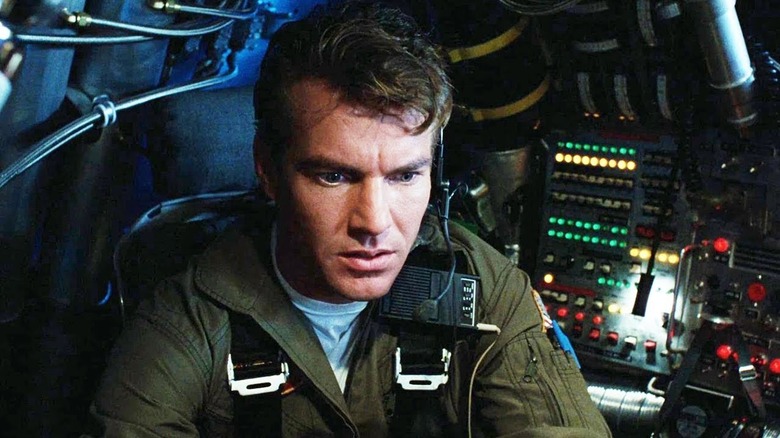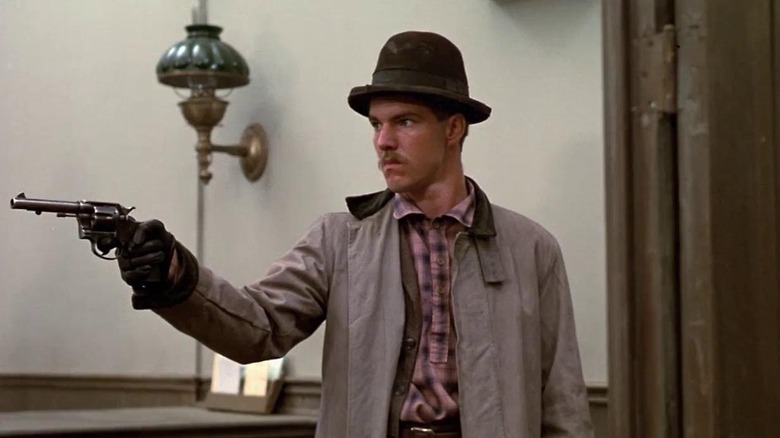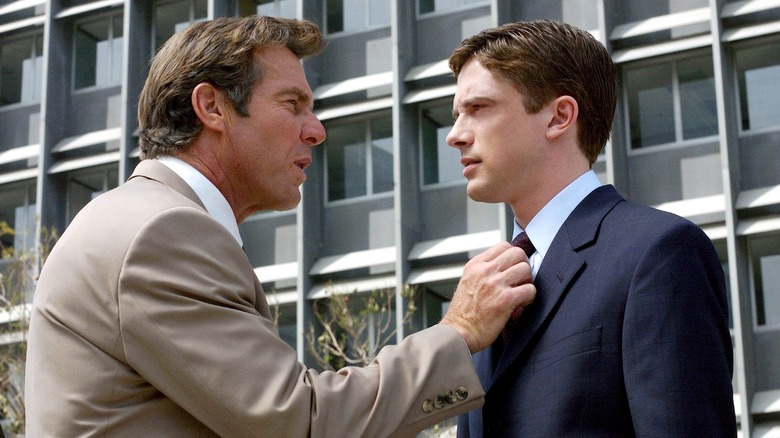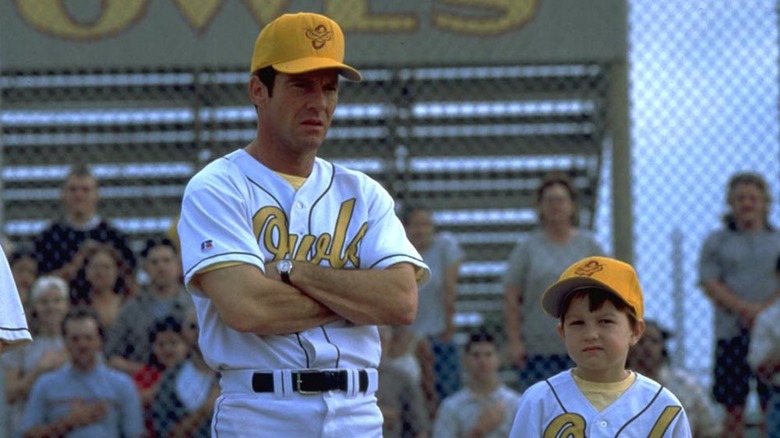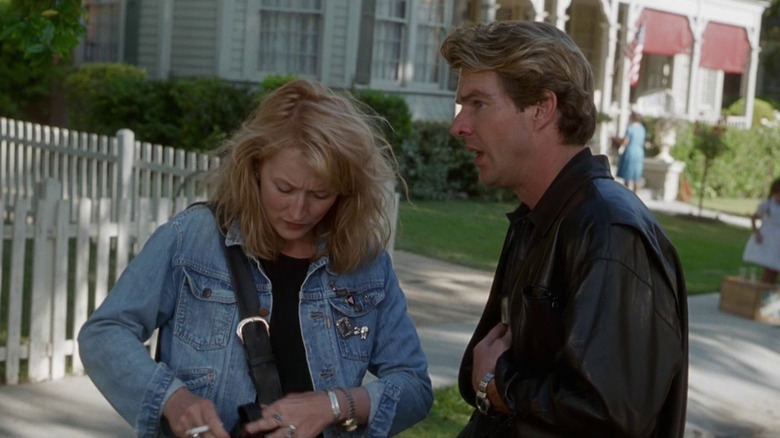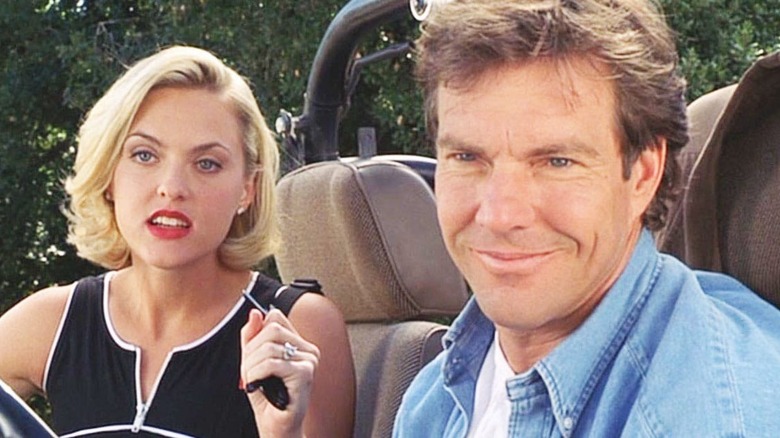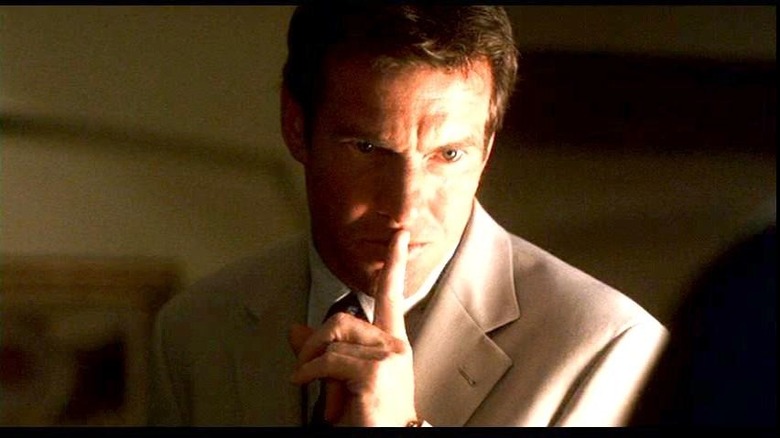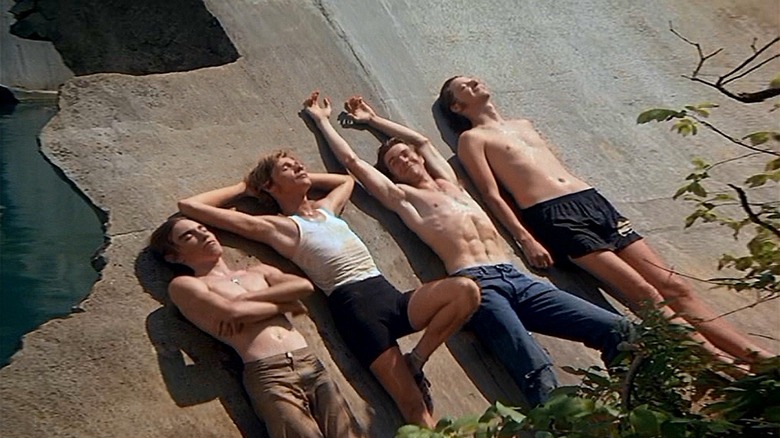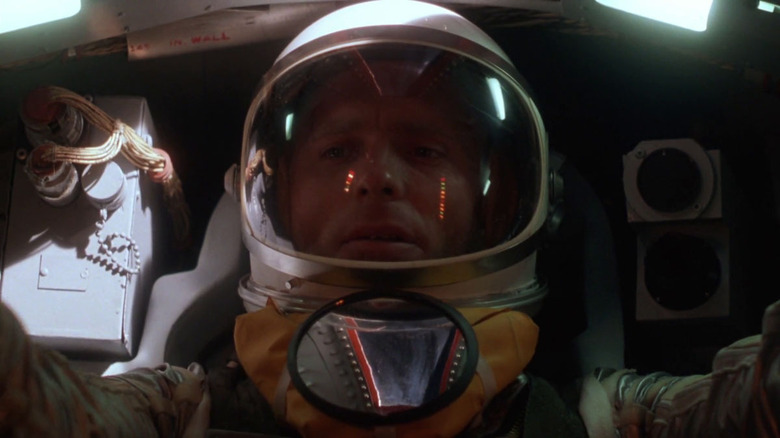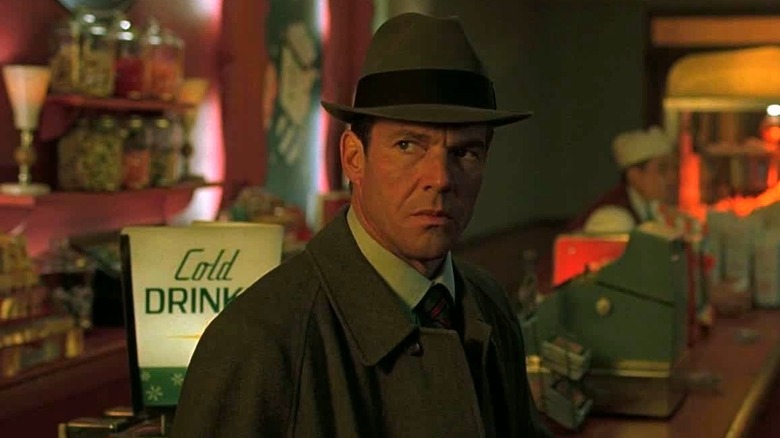16 Best Dennis Quaid Movies Ranked
You know what they say about the apple not falling far from the tree? Well, that was certainly the case with Dennis Quaid, who forged his own path in Hollywood after his older brother, Randy Quaid, had found success as an actor (which is pretty easy to do when your first film is 1971 Oscar juggernaut "The Last Picture Show"). Today, Randy has slowed down acting to deal with a myriad of legal issues, but his younger brother's star keeps shining.
Like his brother, Quaid started acting in his early 20s, but it took him a bit longer to arrive, settling for TV movies and "Baretta" guest appearances before breaking through in the 1979 Oscar-winning teen drama "Breaking Away." With his all-American good looks and easy charm, Quaid was a born movie star, as he would prove time and again over the next four decades.
Despite his lengthy career, Quaid has yet to earn a single Oscar nomination. Not that he hasn't come close, most famously with his acclaimed work in Todd Haynes' 2002 drama "Far From Heaven," for which he received Golden Globe and SAG Awards bids, as well as victories at the Independent Spirits, Chicago, and New York Film Critics Circle Awards. He won an additional Indie Spirit prize in 1987 as Best Actor for "The Big Easy," as well as a SAG Ensemble award for Steven Soderbergh's 2000 film "Traffic." His uncanny portrayal of Bill Clinton in 2010's HBO movie "The Special Relationship" brought him additional Golden Globe, Emmy and SAG bids.
After all these years in the business, how many of Dennis Quaid's films can be considered classics? And how many of those classics have you seen? Here's a look back at Quaid's 16 best film, ranked in order from worst to best.
"D.O.A." (1988)
If you think you're having a bad day, talk to Professor Dexter Cornell (Quaid), because he's got you beat. As "D.O.A." opens, he staggers into a police station to report a murder. The victim: him!
Let's back up a bit: Someone has injected him with a radioactive poison that will kill him in 24 hours. He enlists the student (Meg Ryan) he spent the previous night with to help track down his murderer before it's too late. The only problem, is everyone is a suspect.
Was it the distraught student (Robert Knepper) who committed suicide the day before? Or was it his estranged wife (Jane Kaczmarek)? It could even be the mysterious widow (Charlotte Rampling) with ties to the dead student.
A remake of a 1949 Edmund O'Brien thriller, D.O.A. is an unabashed love letter to film noir, and Quaid was the perfect everyman for this old fashioned endeavor. Ryan was his perfect match, putting a sweet-faced twist on the femme fatale. This was the second film the two made together, and it was on this set that they fell in love, getting married in 1991 (and then divorced in 2001).
"Suspect" (1987)
Quaid reunited with "Breaking Away" director Peter Yates for this crackerjack legal thriller that's as pulpy as they come. It's a cross between John Grisham and Agatha Christie, with a little social consciousness thrown in for good measure.
The premise: Cher plays Kathleen Riley, a public defender representing a homeless, deaf, mute Vietnam veteran (Liam Neeson) accused of killing a Justice Department clerk. Quaid is Eddie Sanger, a Capitol Hill lobbyist serving on the jury. Eddie and Kathleen team up to investigate the murder, and eventually they fall in love. Their partnership — which is unethical, to say the least — uncovers a vast D.C. conspiracy that runs deeper than the murder of one innocent file clerk.
The ending doesn't quite stick the landing (as Roger Ebert pointed out in his lukewarm review), but everything leading up to it is entertaining as hell. There's a real chemistry between Quaid and Cher that is riveting, even when the script by Oscar-winner Eric Roth ("Forrest Gump") takes some wild wrong turns.
"Enemy Mine" (1985)
Having dramatized the early days of the space race in "The Right Stuff," it seems only fitting that Quaid would next try his hand at the space wars. Unfortunately, "Enemy Mine" was no "Star Wars," failing to recoup its massive budget at the box office. It's since gained a cult following, however, that enjoys it for being a uniquely interpersonal sci-fi flick.
Set in the late 21st century, it concerns a galactic battle between humans and a race of reptilian aliens known as Dracs. Pilot Willis E. Davidge (Quaid) is a rabid anti-Dracser who gets stranded on a remote planet after a spacecraft dogfight with the alien Jeriba Shigan (Louis Gossett Jr., in heavy makeup). As the years pass, the two learn to set their differences aside and work together to survive.
Credit to director Wolfgang Petersen for trying to make an antiwar drama in the guise of a sci-fi blockbuster. More credit to Quaid and Gossett Jr for carrying the weight of the drama on their shoulders (and somehow doing it with a straight face).
"Great Balls of Fire!" (1989)
If you're looking for an accurate biopic of rock 'n' roll legend Jerry Lee Lewis, look elsewhere. "Great Balls of Fire" omits or glosses over the more controversial aspects of the singer's past, romanticizing a life that was filled with bad decisions. But it's worth seeing for Quaid, who undoubtedly took the role in a play for Oscar glory.
Directed by Quaid's "The Big Easy" helmer Jim McBride, it follows the early years of Lewis's career, charting his meteoric rise to fame as a rock pianist. He comes crashing back down to Earth, however, when he marries his 13-year-old cousin, Myra Gale Brown (Winona Ryder). As he attempts to pick up the pieces of his shattered life, he clashes with his cousin, Pentecostal minister Jimmy Swaggert (yes, that Jimmy Swaggert), played by Alec Baldwin.
Quaid makes up for the film's narrative shortcomings with his performance, which captures the goofy arrogance and dynamic stage presence that made Lewis a star. It's too bad the script wasn't more concerned with telling the true story of its complicated subject, since the actor portraying him was more than capable of pulling it off.
"Frequency" (2000)
The less you think about the plot of "Frequency," the better. Sure, all the time travel logic doesn't stand up to scrutiny, but as Roger Ebert said in his three-and-a-half star review, "the central idea," that a father and son could communicate across different timelines despite the father being dead, "is strong and carries us along."
In 1969, firefighter Frank Sullivan (Quaid) dies in a warehouse inferno. In 1999, his police officer son, John (Jim Caviezel), discovers he can communicate with his dead dad by way of a ham radio. This comes in handy as the two try not only to save the elder Sullivan's life, but catch a serial killer known as the "Nightingale."
So yeah, this movie is more than a little ridiculous. But you'd require a heart of stone to not be moved by Quaid chatting with his son from beyond the grave. It's that dynamic that keeps us engaged, even when the plot holes start popping up, as they almost always do when a film starts messing with time.
"Innerspace" (1987)
A sort of "Fantastic Voyage" with an '80s twist, Joe Dante's "Innerspace" was an absolute phenomenon when it hit theaters in 1987, pairing with "Three Amigos!" to make Martin Short a household name, as well as making Quaid and Ryan two of the hottest actors in Hollywood.
A freewheeling crowd-pleaser, "Innerspace" still holds up, because of the way it manages to weave together several genres and special effects without spinning wildly out of control. That's thanks in large part to the performances at the center, which keep the story grounded even as it threatens to go off the rails.
Quaid plays Lt. Tuck Pendelton, a test pilot who signs up for a unique experiment: He'll be placed inside a submersible capsule, shrunken to microscopic size, and injected into a lab rabbit for medical study. But things go horribly wrong when he's instead injected into hypochondriac store clerk Jack Putter (Short). It's up to Jack to get Tuck out of his body and back to normal size before it's too late.
Meg Ryan plays Tuck's estranged girlfriend, Lydia Maxwell, a reporter who catches Jack's eye while Tuck is still in his body. Also of special note: the film won an Academy Award for its impressive special effects, making it the only Joe Dante movie to win an Oscar of any kind.
"The Long Riders" (1980)
The legend of Jesse James has been dramatized in more movies than Batman's origin story, with seemingly every generation getting their chance to saddle up for a new retelling. "The Long Riders" is Walter Hill's crack at it, and the twist he wanted was to cast real-life brothers to play the siblings in the film. So of course, he had to get the Quaids, who were red-hot at the time. But he didn't stop there.
Stacey Keach and James Keach are the James brothers, Frank and Jesse, who form a gang of bank robbers in the post-Civil War west. They enlist the Youngers — Cole (David Carradine), Jim (Keith Carradine), and Bob (Robert Carradine) — as well as the Millers — Ed (Dennis Quaid) and Clell (Randy Quaid) — to join their rowdy group, whose exploits attract the attentions of the Pinkerton Detective Agency. The recruitment of the Ford brothers — Charley (Christopher Guest) and Robert (Nicholas Guest) — spells their doom.
Inspired casting aside, this is a pretty straight-forward western, made with meticulous skill by Hill. It's also a great early role for Quaid, who sows the early seeds of destruction for the gang when he kills a bank clerk during a robbery.
"In Good Company" (2004)
Coming off "Far From Heaven," Dennis Quaid's career was suddenly hotter than it had been in over a decade. He was determined to strike while the iron was hot.
Quaid was all over movie screens in 2004, appearing in "The Alamo," "The Day After Tomorrow," the "Flight of the Phoenix" remake and "In Good Company." Some worked, some didn't, but "Company" is generally considered the best of the bunch (although "Day After Tomorrow" has some serious entertainment value), with the actor settling comfortably into the cinematic dad-phase of his career.
Written and directed by Paul Weitz, it centers on a middle-aged advertising executive (Quaid) who suddenly finds himself with a new boss (Topher Grace) who's half his age after his magazine is bought by a major corporation. Things get even weirder when he discovers that the new guy is dating his daughter (Scarlett Johansson). Talk about a mid-life crisis!
Originally titled "Synergy," the film touches upon issues of corporate greed and downsizing that were hot-button issues of the day in a bright, sunny way, with the ruthlessness softened thanks to the domestic storyline. Quaid is convincing as ever as both a father who only wants the best for his daughter, and a career company man beginning to question what it was all about.
"The Rookie" (2002)
Everybody loves a good underdog story, and audiences lapped up this feel-good sports movie about an unlikely major leaguer. It tells the true story of Jim Morris (Quaid), a Texas high school teacher who gave up his dreams of becoming a professional baseball player after a shoulder injury.
He scratches that itch by coaching the school's team, which is mediocre at best. As it turns out, Jimmy still has his fastball, and his team makes him an offer he can't refuse: If they win the state championship, he has to try out for the majors again. Jimmy agrees, despite being 35 years old (Quaid was actually 48 when the film was released). His wife (Rachel Griffiths) supports him no matter what, while his father (Brian Cox) is perpetually disapproving.
Directed by John Lee Hancock, "The Rookie" is a lived-in, beautifully-shot film, as tried and true as a worn-out catcher's mitt. Although you know exactly where it's going (it's a Disney sports film along the lines of "Miracle" and "Invincible"), you can't help but be charmed by it, thanks in large part to Quaid's endearing performance. He also looks like he's got a pretty mean fastball.
"Postcards from the Edge" (1990)
Although Meryl Streep and Shirley MacLaine are the main attraction in this Mike Nichols Hollywood satire, Quaid still manages to shine as the love interest. That's no small feat when you're acting opposite Meryl friggin' Streep.
A thinly veiled tell-all about Carrie Fisher's struggles with addiction, it stars Streep as a down-on-her-luck actress forced to move back in with her mother (MacLaine doing a Debbie Reynolds impersonation) after her latest stint in rehab. She's also trying to get her career back on track with a new movie, and quickly falls in love with the film's producer (Quaid).
But things turn sour when she realizes her new boyfriend is sleeping with the young ingenue (Annette Bening) starring opposite her. This leads to a hilarious scene where Streep, still in costume as a police officer, confronts Quaid at his home. It's also heartbreaking, since it's just another instance of someone taking her for granted, and Quaid is able to play both sides of that coin with expert skill.
"The Parent Trap" (1998)
The rare remake that stands up alongside the original (and in many ways improves upon it), "The Parent Trap" was one of Quaid's earliest forays into family entertainment, and he's a natural fit.
The first film directed by Nancy Meyers, it's an update of the 1961 Disney classic about a pair of identical twins separated at birth and reunited for mischief. Lindsay Lohan plays the twins, Annie and Hallie, who were each raised by one of their biological parents — an American winery owner (Quaid) and a British wedding gown designer (Natasha Richardson). When they meet for the first time at summer camp, they devise a plan to get their mom and dad back together.
There's a good amount of pathos added to the hijinks that elevates this above the usual kids movie, and that's due in large part to Quaid's performance. He's genuinely likable as a good guy who's doomed to marry the wrong woman (Elaine Hendrix) unless his daughters can save the day. This being a Nancy Meyers movie, you can expect things to work out in the end — and in some beautiful kitchens, at that.
"Traffic" (2000)
Although he's just one piece of the puzzle, Quaid still manages to stand out in the massive ensemble of "Traffic." Steven Soderbergh's epic docudrama still packs a punch more than twenty years later, thanks to its visceral filmmaking and deeply-realized performances.
Adapted from the British limited series "Traffik," it examines the war on drugs through multiple perspectives: A newly appointed US drug czar (Michael Douglas) dealing with his teenage daughter's (Erika Christensen) crack addiction; a Mexican police officer (Benicio Del Toro) trying to navigate the thorny relationships between cops and the cartel; a pair of DEA agents (Don Cheadle and Luis Guzman) protecting an informant (Miguel Ferrer); and a wealthy housewife (Catherine Zeta-Jones) ordering a hit on that informant before he can testify against her kingpin husband. Quaid plays Zeta-Jones's lawyer, whose loyalty is — of course — not to be trusted.
The results are a devastating mosaic detailing the true price of the American drug war. Quaid shared the SAG Award for Best Ensemble for the film, which also won Oscars for Best Director, Best Supporting Actor (Del Toro), Best Adapted Screenplay and Best Film Editing (the only prize it lost, oddly enough, was Best Picture).
"Breaking Away" (1979)
Quaid's big breakthrough came with this Oscar-winning crowd pleaser that Roger Ebert called "a movie to embrace." Audiences did indeed embrace this coming-of-age drama, turning its cast of newcomers into overnight stars.
Directed by Peter Yates, it centers on a group of working class kids from Bloomington, Indiana, struggling with life after high school. The college kids derogatorily refer to them as "cutters," derived from the stonecutters who worked in the local quarries. Dave (Dennis Christopher) dreams of joining the Italian bicycling team, much to the consternation of his father (Paul Dooley). He forms a team with his friends, Mike (Quaid), Moocher (Jackie Earle Haley), and Cyril (Daniel Stern), to compete in the Little 500 at Indiana University, where they show up those snooty out-of-towners.
It was clear from the beginning Quaid had the makings of a major star, shining through even in this small role. "Breaking Away" was a major commercial success, winning the Oscar for Steve Tesich's original screenplay and earning four additional nominations, including Best Picture and Best Director.
"The Right Stuff" (1983)
Although it failed to launch at the box office, Philip Kaufman's epic astronaut drama has only grown in reputation since it was released in 1983. It was also a major turning point for Quaid, who rode the critical plaudits for his performance to increasingly bigger roles.
Adapted from Tom Wolfe's bestselling nonfiction book, it's a three-and-a-half hour recounting of the early days of America's space program. As the Russians launch a satellite into orbit, the US races to launch a human. They quickly form the Mercury 7, a group of renegade military pilots who became the country's first astronauts: Scott Carpenter (Charles Frank), Gordon Cooper (Quaid), John Glenn (Ed Harris), Gus Grissom (Fred Ward), Wally Schirra (Lance Henriksen), Alan Shepard (Scott Glenn), and Deke Slayton (Scott Paulson).
Despite bombing in theaters, the film did earn eight Oscar nominations, including Best Picture, and won four technical trophies (for film editing, score, sound mixing, and sound editing). Quaid, meanwhile, continued to prove he had the right stuff as a movie star. He's undeniably charming as Cooper, whose daredevil antics keep his wife Trudy (Pamela Reed) awake at night.
"The Big Easy" (1987)
Jim McBride's sexy, sweaty neo-noir plays to Quaid's strengths as a leading man while also adding surprising new shades to his persona. That's because the character he plays here is so rich and complex: A cop trying to excuse his own corruption, desperately trying to do the right thing when it counts.
"The Big Easy" stars Quaid as Remy McSwain, a New Orleans homicide detective investigating the murder of a local mob boss, which just might've been carried out by his fellow police officers. But Remy has his own problems with unscrupulous behavior, which are called out by state district attorney Anne Osborne (Ellen Barkin). Though he tries to excuse it as part of working within the system, he knows she's right. As the two dive deeper and deeper into the muck of the investigation, they fall deeper and deeper in love.
The chemistry between Quaid and Barkin is so palpable you can slice it with a knife. There's also a surprising amount of tenderness in their relationship that makes it even steamier. Quaid won the Independent Spirit Award as Best Actor for the film, which also earned bids for Best Picture and Best Director from the organization (but where the heck was that Oscar nomination?!).
"Far From Heaven" (2002)
"Far From Heaven" brought Quaid closer to awards glory than he'd ever come before or since, and it's little wonder why. It's a career-best performance from an actor who is too often taken for granted. By asking him to play into the vulnerability lurking beneath his confident persona, writer-director Todd Haynes taps into his talent in a way that lights up the screen.
A faithful recreation of Douglas Sirk melodramas like "All That Heaven Allows," it centers on Cathy Whitaker (Julianne Moore), a 1950s suburban housewife whose life is upended when she sees her husband Frank (Quaid) kissing another man. As Frank tries to cure himself of his "problems," she finds herself falling in love with their black gardener, Raymond (Dennis Haysbert). Cathy's narrow worldview is slowly opened up, even as the neighbors whisper behind her back. Yet, societal norms keep these three from living their true lives.
Quaid is devastating as a man desperate to hide his true self at the risk of being shunned. An Academy Award nomination seemed certain after Best Supporting Actor victories at the Independent Spirits, Chicago Film Critics, and New York Film Critics Circle, plus nominations at the Golden Globes and SAG Awards. Yet Oscar voters overlooked him, and it's truly a shame: His performance is so good, you could've almost seen him winning the gold for it.
